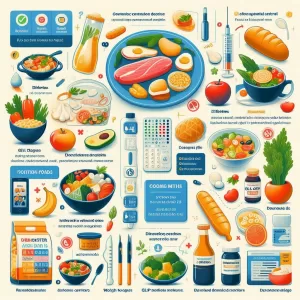12 Essential Tips for a Healthy Lifestyle: Boost Your Wellbeing and Vitality
جدول المحتويات
Exercising regularly, eating nourishing foods, and reducing your intake of sugar and alcohol are just some of the recommendations for maintaining a healthy lifestyle.
Taking care of your health is arguably the most important thing you can do for yourself and your loved ones.
Whether you make a point to eat more fruits and vegetables or get outside for a daily walk, there isn’t just one way to maintain a healthy lifestyle.
To center health and wellness in your life, try including some or all of the 12 tips we include in this article. Adopting just a few of these recommendations can go a long way toward improving your physical and mental well-being.

Maintain a healthy weight for you
Keeping your weight in a healthy range can protect you from things like high blood pressure, high cholesterol, heart disease, stroke, and type 2 diabetes.
But what exactly is a healthy range?
Your body mass index (BMI) and your waist circumference are two measurements that can help determine if you have a healthy weight, according to the National Institute of Diabetes and Digestive and Kidney Diseases (NIDDK). A doctor will also consider other factors, such as your age, ethnicity, body composition, and health history, when recommending a healthy weight range for you.
Remember, weight isn’t just about a number on the scale. Everyone is different, so it’s best to work with a doctor to determine a healthy weight for you.
Eat nourishing foods
Our bodies need a variety of foods to give us energy and keep them running. That means eating a balanced diet that contains vitamins, minerals, and fiber, which can be found in fruits and vegetables (with a focus on leafy greens), whole grains, legumes, nuts, lean protein, and low-fat dairy, per the NIDDK.
Of course, it’s OK to have a treat once in a while, but it’s best if the bulk of your everyday meals and snacks contain some of those vital nutrients.
Limit processed foods and sugar
It’s best to eat mostly nutrient-dense foods. This means limiting highly processed foods, like packaged and frozen foods, that typically have fewer nutrients but more calories, fat, salt, and added sugars. You should also limit your intake of soda, packaged cookies and chips, candy, and sweetened cereals.
If you’re having a hard time giving up packaged snacks or fast food, you can try slowly swapping out these processed meals and snacks for whole foods. It’s not a perfect science, and setbacks are a normal part of making big changes in your life.
Drink water and stay hydrated
Staying hydrated isn’t just about quenching your thirst; it also keeps your body and brain running. Not only can drinking enough water improve your thinking abilities, but it may also help:
- improve digestion
- increase your energy
- decrease joint pain
- improve your heart health
Advice on how much water to drink per day varies, but anywhere between 8 and 13 cups a day is a good target.
Exercise regularly
Moving your body has a host of health benefits, including:
- boosting your mood
- giving you more energy
- building muscle
- protecting your bones
- losing or maintaining weight
- helping you get better sleep
Regular exercise can also help prevent chronic conditions like heart disease, type 2 diabetes, and some types of cancer.
You’ll want to aim for 150–300 minutes of moderate-intensity aerobic exercise or 75 minutes of vigorous exercise per week, according to the Department of Health and Human Services.
Reduce sitting and screen time
In addition to getting your heart pumping, spending less time sitting can improve your overall health.
Prolonged sitting and sedentary behavior have been linked to an increased chance of heart disease, weight gain, and early death. However, regular exercise doesn’t completely balance these effects. So, it’s a good idea to get your workouts in and take breaks from sitting throughout the day. Plus, cutting down on screen time won’t hurt either.
Get outdoors daily
Being out in nature has a way of putting things in perspective, but it also has proven benefits for your mental health. Not only can soaking up the sun ease symptoms of depression, but it can also make you feel more relaxed and focused, particularly when you take notice of your surroundings.
Getting outside can also ease feelings like worry and sadness and promote happiness, optimism, and a sense of connection with the world. Sunlight is also the best source of vitamin D.
Get plenty of sleep
We all know sleep is important, but getting good sleep is really critical to your overall health. When you sleep, your body is actually completing a number of essential tasks, like:
- maintaining bodily functions
- repairing muscle tissue
- restoring energy
- processing new memories and information in the brain
When you don’t get enough sleep, you may be irritable and emotional and have trouble focusing. If sleep deprivation becomes chronic, it can even increase the chance of cardiovascular disease, type 2 diabetes, and depression.
For all of these reasons, it’s important for most adults to get between 7 and 9 hours of sleep every night.
Go easy on the alcohol
Having a drink now and then is perfectly fine, but make sure to limit alcohol to no more than one drink per day for women and one to two drinks per day for men, according to the Department of Agriculture Dietary Guidelines.
Having more than that could have a negative effect on your health. In case you’re curious, one drink is typically defined as 12 ounces of beer, 5 ounces of wine, or 1.5 ounces of hard liquor such as gin or vodka.
There are a few studies that suggest some alcohol could have health benefits, according to Harvard’s School of Public Health. However, more recent research suggests no amount of alcohol is really “safe” to consume.”If you do drink, it’s best to do so in moderation.
Quit smoking (if you smoke)
Smoking releases harmful chemicals into your body and can damage lung tissue, heart health, and more. It’s no surprise that smoking is also the number-one risk factor for lung cancer.
That’s why quitting smoking is one of the most important things you can do for your health, no matter your age or how long you’ve smoked. In fact, quitting smoking can add up to 10 years to your life expectancy, according to the Centers for Disease Control and Prevention (CDC).
Knowing it’s best for your health to quit smoking is one thing, but actually doing it can be quite hard. The good news is that there are lots of resources and medications that can help.
Consider taking a multivitamin supplement
Multivitamins may be an important part of your routine, particularly if you have a nutritional deficiency due to:
- older age
- حمل
- malabsorption issues
- certain medications
Outside of that, research is still mixed on whether multivitamins are effective at improving health, according to Harvard’s School of Public Health. That said, taking a daily multivitamin within the recommended daily allowance likely won’t harm you either.
Stay on top of health screenings and check-ups
When life gets busy, annual physicals and bi-yearly dental cleanings may fall by the wayside, but these check-ups are important to stay on top of your health, according to the CDC.
It’s also important to attend health screenings that you are due for, such as a breast mammogram or a colonoscopy. These can detect disease early, making it easier to treat. Keeping up to date with your vaccinations can also help prevent certain infections or diseases.
Regardless, scheduling regular checkups with a doctor and dentist is one great way to maintain a healthy lifestyle.
Frequently Asked Questions (FAQ) about Maintaining a Healthy Lifestyle
1. How can I lose weight in a healthy way?
The article emphasizes maintaining a healthy weight but doesn’t give specific weight-loss advice. It’s best to consult a doctor or registered dietitian for a personalized plan. However, the article does mention that keeping your weight in a healthy range can help prevent chronic diseases [1].
2. I hate plain water. Are there other ways to stay hydrated?
While water is best, unsweetened tea and flavored sparkling water can also contribute to your daily fluid intake [8].
3. How much exercise is really necessary?
The article recommends 150–300 minutes of moderate-intensity aerobic exercise or 75 minutes of vigorous exercise per week [5]. But even small amounts of activity are better than none! Start slow and gradually increase the duration and intensity of your workouts [7].
4. I don’t have time to cook healthy meals all the time. What can I do?
There are plenty of healthy frozen meals and pre-cut vegetables available these days. Look for options with minimal added sugar, sodium, and unhealthy fats [3]. Meal prep on weekends can also save time during the week [3].
5. I can’t seem to get a good night’s sleep. Any tips?
The article recommends getting 7-9 hours of sleep each night [6]. Creating a relaxing bedtime routine, avoiding screens before bed, and establishing a consistent sleep schedule can all contribute to better sleep [6].
يبعد
Paying attention to your lifestyle and daily habits is the first step to making changes that can benefit your health in the long run. Think of these tips as a jumping-off point to maintain a healthy lifestyle and live your best life possible for as long as possible.
2 تعليقات
اترك ردّاً
المقالات الشعبية








Certainly, this post can fit under my fitness category!
This post is also relevant to my mental health category.